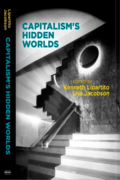Kenneth J. Lipartito
Published in 2020

University of Pennsylvania Press, Edited by Kenneth Lipartito and Lisa Jacobson
Observers see free markets, the relentless pursuit of profit, and the unremitting drive to commodify everything as capitalism’s defining characteristics. These most visible economic features, however, obscure a range of other less evident, often unmeasured activities that occur on the margins and in the concealed corners of the formal economy. The range of practices in this large and diverse hidden realm encompasses traders in recycled materials and the architects of junk bonds and shadow banking. It includes the black and semi-licit markets that allow wealthy elites to avoid taxes and the unmeasured domestic and emotional labor of homemakers and home care workers. By some estimates, the unmeasured economic activity that occurs within the household, informal market, and underground economy amounts to a substantial portion of all economic activity in the world, as much as 30% in some countries.
Capitalism’s Hidden Worlds sheds new light on this shadowy economic landscape. In doing so, it reexamines how we think about the market. In particular, it scrutinizes the missed connections between the official, visible realm of exchange and the uncounted and invisible sectors that border it. While some hidden markets emerged in opposition to the formal economy, much of the obscured economy described in this volume operates as the other side of the legitimate, state-sanctioned marketplace. A variety of historical actors—from fortune tellers and forgers to tax lawyers and black market consumers—have constructed this unseen world in tandem with the observable public world of transactions. Others, such as feminist development economists and government regulators, have worked to bring the darkened corners of the economy to light. The essays in Capitalism’s Hidden Worlds explore how the capitalist marketplace sustains itself, how it acquires legitimacy and even prestige, and how the marginalized and the dispossessed find ways to make ends meet.